
Peachum, a fence and thief-catcher, justifies his actions.[16] Mrs. Peachum, overhearing her husband's blacklisting of unproductive thieves, protests regarding one of them, Bob Booty (the nickname of Robert Walpole). The Peachums discover that Polly, their daughter, has secretly married Macheath, the famous highwayman, who is Peachum's principal client. Upset to find out that he will no longer be able to use Polly in his business, Peachum and his wife ask how Polly will support such a husband "in Gaming, Drinking and Whoring." Nevertheless, they conclude that the match may make sense if the husband can be killed for his money. They leave to carry out this errand. However, Polly has hidden Macheath.
Macheath goes to a tavern where he is surrounded by women of dubious virtue who, despite their class, compete in displaying perfect drawing-room manners, although the subject of their conversation is their success in picking pockets and shoplifting. Macheath discovers, too late, that two of them (Jenny Diver, Suky Tawdry) have contracted with Peachum to capture him, and he becomes a prisoner in Newgate prison. The prison is run by Peachum's associate, the corrupt jailer Lockit. His daughter, Lucy Lockit, has the opportunity to scold Macheath for having agreed to marry her and then broken this promise. She tells him that to see him tortured would give her pleasure. Macheath pacifies her, but Polly arrives and claims him as her husband. Macheath tells Lucy that Polly is crazy. Lucy helps Macheath to escape by stealing her father's keys. Her father learns of Macheath's promise to marry her and worries that if Macheath is recaptured and hanged, his fortune might be subject to Peachum's claims. Lockit and Peachum discover Macheath's hiding place. They decide to split his fortune.
Meanwhile, Polly visits Lucy to try to reach an agreement, but Lucy tries to poison her. Polly narrowly avoids the poisoned drink, and the two girls find out that Macheath has been recaptured owing to the inebriated Mrs Diana Trapes. They plead with their fathers for Macheath's life. However, Macheath now finds that four more pregnant women each claim him as their husband. He declares that he is ready to be hanged. The narrator (the Beggar), notes that although in a properly moral ending Macheath and the other villains would be hanged, the audience demands a happy ending, and so Macheath is reprieved, and all are invited to a dance of celebration, to celebrate his wedding to Polly.
1 Beggar's Opera peut-être considéré comme un musical fondateur, c'est-à-dire ayant marqué l'histoire des musicals. Premier "opéra" anglais.
Origin and analysis
The original idea of the opera came from Jonathan Swift, who wrote to Alexander Pope on 30 August 1716 asking "...what think you, of a Newgate pastoral among the thieves and whores there?" Their friend, Gay, decided that it would be a satire rather than a pastoral opera. For his original production in 1728, Gay intended all the songs to be sung without any accompaniment, adding to the shocking and gritty atmosphere of his conception.[7] However, a week or so before the opening night, John Rich, the theatre director, insisted on having Johann Christoph Pepusch, a composer associated with his theatre, write a formal French overture (based on two of the songs in the opera, including a fugue based on Lucy's 3rd act song "I'm Like A Skiff on the Ocean Toss'd") and also to arrange the 69 songs. Although there is no external evidence of who the arranger was, inspection of the original 1729 score, formally published by Dover Books, demonstrates that Pepusch was the arranger.
The work took satiric aim at the passionate interest of the upper classes in Italian opera, and simultaneously set out to lampoon the notable Whig statesman Robert Walpole, and politicians in general, as well as the notorious criminals Jonathan Wild and Jack Sheppard. It also deals with social inequity on a broad scale, primarily through the comparison of low-class thieves and whores with their aristocratic and bourgeois "betters."
Gay used Scottish folk melodies mostly taken from the poet Allan Ramsay's hugely popular collection The Gentle Shepherd (1725) plus two French tunes (including the carol 'Bergers, Ecoutez La Musique!' for his song 'Fill Every Glass'), to serve his hilariously pointed and irreverent texts. The renowned composer, John Christopher Pepusch, composed an Ouverture and arranged all the tunes shortly before the opening night at Lincoln's Inn Fields on 28 January 1728. However, all that remains of Pepusch's score are the Ouverture (with complete instrumentation) and the melodies of the songs with unfigured basses. Various reconstructions have been attempted, and a 1990 reconstruction of the score by American composer Jonathan Dobin has been used in a number of modern productions.
Gay uses the operatic norm of three acts (as opposed to the standard in spoken drama of the time of five acts), and tightly controls the dialogue and plot so that there are surprises in each of the forty-five fast-paced scenes and 69 short songs. The success of the opera was accompanied by a public desire for keepsakes and mementos, ranging from images of Polly on fans and clothing, playing cards and fire-screens, broadsides featuring all the characters, and the rapidly published musical score of the opera.
The play is sometimes seen to be a reactionary call for libertarian values in response to the growing power of the conservative Whig party. It may also have been influenced by the then-popular ideology of Locke that men should be allowed their natural liberties; these democratic strains of thought influenced the populist movements of the time, of which The Beggar's Opera was a part.
The character of Macheath has been considered by critics as both a hero and an anti-hero. Harold Gene Moss, arguing that Macheath is a noble character, has written, "[one] whose drives are toward love and the vital passions, Macheath becomes an almost Christ-like victim of the decadence surrounding him." Contrarily, John Richardson in the peer-reviewed journal Eighteenth-Century Life has argued that Macheath is powerful as a literary figure precisely because he stands against any interpretation, "against expectation and illusion."
The Beggar's Opera has had an influence on all later British stage comedies, especially on nineteenth century British comic opera and the modern musical.
Adaptations
As was typical practice of the time in London, a commemorative "score" of the entire opera was assembled and published quickly. As was common, this consisted of the fully arranged overture followed by the melodies of the 69 songs, supported by only the simplest bass accompaniments. There are no indications of dance music, accompanying instrumental figures or the like, except in three instances: Lucy's "Is Then His Fate Decree'd Sir" – one measure of descending scale marked "Viol." –; Trape's "In the Days of My Youth", in which the "fa la la chorus is written as "viol."; and the final reprieve dance, Macheath's "Thus I Stand Like A Turk", which includes two sections of 16 measures of "dance" marked "viol." (See the 1729 score, formerly published by Dover).
The absence of the original performing parts has allowed many producers and arrangers to have free creative reign. The tradition of personalized arrangements, dating back at least as far as Thomas Arne's later 18th century arrangements, continues today, running the gamut of musical styles from Romantic to Baroque: Austin, Britten, Sargent, Bonynge, Dobin and other conductors have each imbued the songs with a personal stamp, highlighting different aspects of characterization. Following is a list of some of the most highly regarded 20th-century arrangements and settings of the opera.
In 1920, the baritone Frederic Austin newly arranged the music (and also sang the role of Peachum) for the long-running production (1,463 performances) at the Lyric Theatre, Hammersmith. The Irish baritone Frederick Ranalow sang the role of Captain Macheath in every performance. In 1955 this version was recorded by conductor Sir Malcolm Sargent with John Cameron as Macheath and Monica Sinclair as Lucy.
In 1928, on the 200th anniversary of the original production, Bertolt Brecht (words) and Kurt Weill (music) created a popular new musical adaptation of the work in Germany entitled Die Dreigroschenoper (The Threepenny Opera). In this work, the original plot is followed fairly closely (although the time is brought forward over a hundred years) but the music is almost all new.
In 1948, Benjamin Britten created an adaptation with new harmonisations and arrangements of pre-existing tunes. Additional dialogue was written by the producer, Tyrone Guthrie. Peter Pears was the first singer of Macheath.
The opera was made into a film version in 1953, and starred Laurence Olivier as Captain Macheath.
In 1975, Czech playwright (and future president) Václav Havel created a non-musical adaptation.
In 1977, the Nigerian Nobel Prize-winning playwright and dramatist Wole Soyinka wrote, produced and directed Opera Wonyosi (publ. 1981), an adaptation of both John Gay's The Beggar's Opera and Bertolt Brecht's The Threepenny Opera; most of his characters as well as some of the arias are from the two earlier plays.
In 1981 Richard Bonynge and Douglas Gamley arranged a new edition for The Australian Opera (now Opera Australia). It was recorded the same year with Joan Sutherland, Kiri Te Kanawa, James Morris and Angela Lansbury.
The opera was adapted for BBC television in 1983. This production was directed by Jonathan Miller and starred Roger Daltrey in the role of Macheath, Stratford Johns as Peachum, Gary Tibbs as Filch, and Bob Hoskins as the Beggar. The "happy" ending was changed so that Macheath is hanged instead of being reprieved.
In 1984 in the play (and later film) A Chorus of Disapproval by Alan Ayckbourn, an amateur production of The Beggar's Opera is a major plot driver and excerpts are performed.
In 1986 in the Brazilian musical film Ópera do Malandro (American title Malandro), by Ruy Guerra (director) and Chico Buarque (writer and composer).
In 1990, American composer Jonathan Dobin[9][12] created a performing edition for the Ten Ten Players in New York City. The edition contains orchestrations for all 69 songs from the extant skeletal score and fleshes out the choruses, dances and intervening ritornelli in a baroque style. The New York Times wrote, "only a trace of Pepusch's score has survived… the music was reconstructed in a convincing period style by Jonathan Dobin, the ensemble's harpsichordist".
In 1998, the all female Japanese troupe, Takarazuka Revue, produced an adaptation titled Speakeasy. The play was Maya Miki's retirement play.
In 2008 the Sydney Theatre Company of Australia and Out of Joint Theatre Company co-produced a version entitled The Convict's Opera written by Stephen Jeffreys and directed by Max Stafford-Clark. This version is set aboard a convict ship bound for New South Wales, where convicts are putting on a version of The Beggar's Opera. The lives of the convicts partly mirror their characters in The Beggars' Opera, and modern popular songs are performed throughout the piece. 'The Convict's Opera' began touring the UK in early 2009.
Vanishing Point created a modern production of The Beggar's Opera in 2009 for The Royal Lyceum Theatre and Belgrade Theatre, Coventry, set in a near-future apocalypse world. It features music from A Band Called Quinn.
Beginning on 27 November 2010, an adaption of The Beggar's Opera, called "One Wife Too Many" was staged at the Nowra Players in regional New South Wales, Australia.
In July/August 2011 YAP Theatre Company staged a new adaptation of The Beggar's Opera in Swindon and London, UK, with an updated script by Matt Fox and a new musical arrangement by Jessie Thompson.
The original opera was performed in an 18th century setting at the Open Air Theatre, Regent's Park in summer 2011, in a production directed by Lucy Bailey.
Aucun dossier informatif complémentaire concernant Beggar's Opera
Aucun dossier informatif complémentaire concernant Beggar's Opera

Version 1
Beggar's Opera (1728-09-Lincoln's Inn Fields Theatre-London)
Type de série: OriginalThéâtre: Lincoln's Inn Fields Theatre (Londres - Angleterre) Durée : Nombre : 62 représentationsPremière Preview : 29 September 1728
Première: 29 September 1728
Dernière: InconnuMise en scène : Chorégraphie : Producteur : Star(s) : Commentaires : It ran for 62 performances, the longest run then known, and the success of the production enabled John Rich to build a new theatre in Covent Garden, the forerunner of the Royal Opera House. The Beggar's Opera was first heard of Covent Garden in 1732.
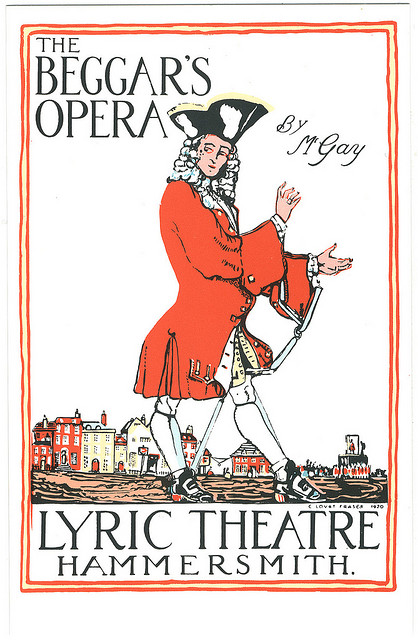
Version 2
Beggar's Opera (1920-06-Lyric Hammersmith Theatre-London)
Type de série: RevivalThéâtre: Lyric Hammersmith (Londres - Angleterre)
Durée : Nombre : 1463 représentationsPremière Preview : 05 June 1920
Première: 05 June 1920
Dernière: InconnuMise en scène : Chorégraphie : Producteur : Star(s) : Avec: Sylvia Nelis / Kathryn Hilliard / Nellie Walker / Violet Marquesita / Frederic Austin / Frederick Ranalow / Alfred Heather / Dorothy Smithard / Phyllis Blackburne / Nonny LockCommentaires : En 1920, Beggar's Opera fut remonté au Lyric Hammersmith Theatre à Londres et on en donna 1463 représentations, record inégalé à ce jour!
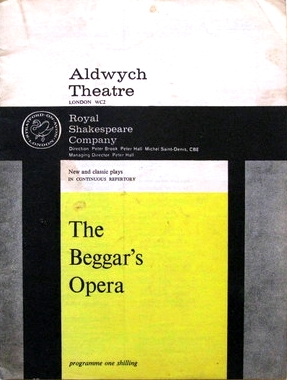
Version 3
Beggar's Opera (1963-07-Aldwych Theatre-London)
Type de série: RevivalThéâtre: Aldwych Theatre (Londres - Angleterre) Durée : Nombre : 43 représentationsPremière Preview : 16 July 1963
Première: 16 July 1963
Dernière: InconnuMise en scène : Peter Wood • Chorégraphie : Pauline Grant • Producteur : Star(s) : Avec: Cast: Ronald Radd (Peachum), Doris Hare (Mrs Peachum), Dorothy Tutin (Polly Peachum), Derek Godfrey (Macheath), Patricia Kilgarriff (Jenny Diver), Virginia McKenna (Lucy Lockitt), Tony Church (Lockitt)Commentaires : A Royal Shakespeare Company production played in repertoire for a limited run of 43 performances. Set on a Thames hulk and performed by a group of convicts awaiting transportation to the West Indies, it was slaughtered by the critics in every respect. It was claimed none of the actors could sing, the production was unbelievably slow and ponderous, Sean Kenny's sets were hideous and unworkable, with some wildly inappropriate additional music written by Raymond Leppard. The Plays and Players critic wrote: “There were times in fact when I began to wish I were watching some relatively fast-moving work like Tristan at Bayreuth instead of this monumental bore that the programme so amusingly describes as a 'comedy by John Gay'”.

Version 4
Beggar's Opera (1963-07-Aldwych Theatre-London)
Type de série:Théâtre: Aldwych Theatre (Londres - Angleterre) Durée : Nombre : Première Preview : Inconnu
Première: 16 July 1963
Dernière: InconnuMise en scène : Peter Wood • Chorégraphie : Pauline Grant • Producteur : Star(s) : Avec: Layne-Smith Donald (Ben Budge), Cooper Ann (Betty Doxy), Rivers Malcolm (Crook-Fingered Jack), Collier Patience (Diana Trapes), Conolly Patricia (Dolly Trull), Angadi Darien (Drawer), Williams Michael (Filch), Honeycombe Gordon (Harry Paddington), Cobner John (Jailer), Rippon Michael (Jemmy Twitcher), Kilgarriff Patricia (Jenny Diver), Church Tony (Lockit), McKenna Virginia (Lucy Lockit), Godfrey Derek (MacHeath), Bisset Donald (Marine Officer), Morgan Gareth (Matt o' the Mint), Alcorn Joan (Molly Brazen), Coffey Denise (Mrs Coaxer), Hare Doris (Mrs Peachum), Griffiths Valerie (Mrs Slammekin), Spriggs Elizabeth (Mrs Vixen), Angadi Darien (Nimming Ned), Radd Ronald (Peachum), Morgan Gareth (Poet), Tutin Dorothy (Polly Peachum), Cobner John (Robin of Bagshot), Bamber Tim (Slippery Sam), Webster Mary (Suky Tawdry), Bamber Peter (Tom Tipple), Arthure Richard (Unnamed parts), Ashton Barry (Unnamed parts), Gardnier Kenneth (Unnamed parts), Howell Dane (Unnamed parts), Walker April (Unnamed parts), Harwood John (Wat Dreary)Commentaires : Un spectacle de la RSC.
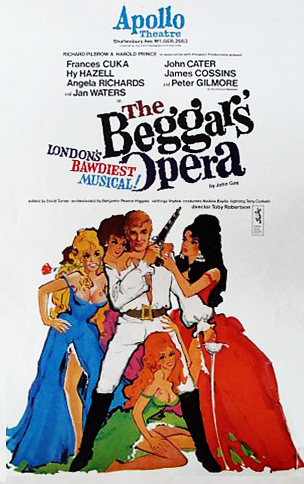
Version 5
Beggar's Opera (1968-09-Apollo Theatre-London)
Type de série: RevivalThéâtre: Apollo Theatre (Londres - Angleterre) Durée : Nombre : 32 représentationsPremière Preview : 12 September 1968
Première: 12 September 1968
Dernière: InconnuMise en scène : Toby Robertson • Chorégraphie : Producteur : Star(s) : Avec: Cast: Peter Gilmore (Macheath), James Cossins (Peachum), Hy Hazell (Mrs Peachum), Jan Waters (Polly), Angela Richards (Jenny Diver), Frances Cuka (Lucy Lockit)Commentaires : Notes: This was a “modernised” version, with completely new dialogue and up-to-date musical arrangements and had been first produced at the Edinburgh Festival. It was generally liked by the critics and the cast was highly praised, but lasted a few weeks only.

Version 6
Beggar's Opera (1980-08-Lyric Hammersmith Main House-London)
Type de série: RevivalThéâtre: Lyric Hammersmith (Londres - Angleterre) Durée : Nombre : Première Preview : 19 August 1980
Première: 19 August 1980
Dernière: InconnuMise en scène : Chorégraphie : Producteur : Star(s) : Avec: Brian Protheroe, Fiona Fullerton, Margaret Courtenay, Jane HardyCommentaires : This opened the new season at the Lyric Hammersmith, and was chosen to mark the 60th anniversary of the famous Nigel Playfair production of 1920 - the legendary “Beggar’s Opera” which ran for over three years and made a large profit at a time when the Lyric was facing severe financial problems. Unfortunately this revival did not achieve anything like the same public appeal and according to Ned Sherrin in “Plays & Players” was “much spat upon” by the critics and was “a great embarrassment”.
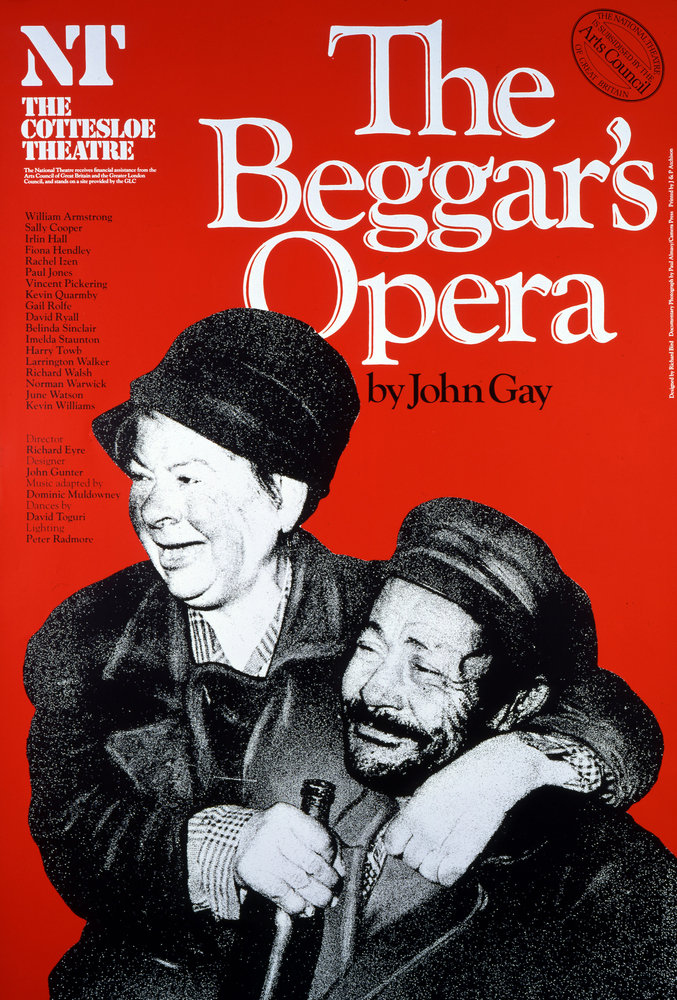
Version 7
Beggar's Opera (1982-06-National Theatre - Cottesloe Theatre-London)
Type de série: RevivalThéâtre: National Theatre (Londres - Angleterre) Salle : Dorfman TheatreDurée : Nombre : Première Preview : 24 June 1982
Première: 01 July 1982
Dernière: InconnuMise en scène : Richard Eyre • Chorégraphie : David Toguri • Producteur : Star(s) : Avec: Harry Towb (Peachum), June Watson (Mrs Peachum), Belinda Sinclair (Polly Peachum), Paul Jones (Macheath), Fiona Hendley (Jenny Diver), Imelda Staunton (Lucy Lockitt), David Ryall (Lockitt)Commentaires : This revival was set in a Victorian Workhouse and was well received by the critics. It was always planned for a limited run.

Version 8
Beggar's Opera (1982-07-Cottesloe Theatre-NT-London)
Type de série: RevivalThéâtre: National Theatre (Londres - Angleterre) Salle : Dorfman TheatreDurée : 1 an 3 mois 1 semaine Nombre : 124 représentationsPremière Preview : Inconnu
Première: 01 July 1982
Dernière: 10 October 1983Mise en scène : Richard Eyre • Chorégraphie : Producteur : Star(s) :
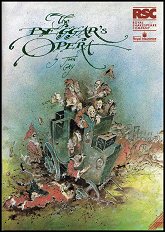
Version 9
Beggar's Opera (1993-04-Barbican Hall-London)
Type de série: RevivalThéâtre: Barbican (Londres - Angleterre) Salle : HallDurée : Nombre : Première Preview : 07 April 1993
Première: 07 April 1993
Dernière: InconnuMise en scène : John Caird • Chorégraphie : Anthony Van Laast • Producteur : Star(s) : Avec: Paul Jesson (Peachum), Susan-Jane Tanner (Mrs Peachum), Elizabeth Renihan (Polly Peachum), David Burt (Macheath), Samantha Shaw (Jenny Diver), Jenny Russell (Lucy Lockitt), Anthony O’Donnell (Lockitt)Commentaires : This is an adaptation of John Gay’s masterpiece by John Caird and the composer Ilona Sekacz, first performed at the Royal Shakespeare Company in 1992. It opened at the Swan Theatre on 7th April and played in repertoire for the whole of the 1992 season. It then transferred to the Barbican Theatre in London, opening on the 7th April 1993.
This revival was very much in the “Les Miserables” style, and was described as “low life augmented by high camp”.
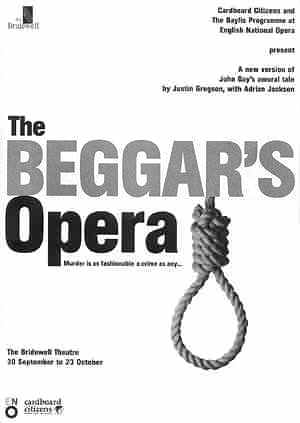
Version 10
Beggar's Opera (1999-10-Bridewell Theatre-London)
Type de série: RevivalThéâtre: Bridewell Theatre (Londres - Angleterre) Durée : 2 semaines Nombre : Première Preview : 30 September 1999
Première: 05 October 1999
Dernière: 23 October 1999Mise en scène : Adrian Jackson • Chorégraphie : Producteur : Star(s) : Avec: Dele Adagunodo (Peachum), Mary King (Mrs Peachum), Victoria Ward (Polly Peachum), James Staddon (Macheath), Alexandra Howlett (Jenny Diver), Sophie Langham (Lucy Lockitt), Graham Kent (Lockitt)Commentaires : This was a joint production between the English National Opera’s outreach programme and Cardboard Citizens, Britain’s only professional theatre company for the homeless. The anticipation was a telling comment on how little had changed from the 18th century’s attitude to the poor and the ruling class. But the end result was felt to be a bit of a mess: the show was frequently interrupted with video-diary sound-bites from both fictional characters and today’s real homeless projected on a bank of TV monitors; the action was held up with some strange karaoke-type pop songs including “Love and Marriage”, “It’s Not Unusual”, “Thank Heaven for Little Girls” and even “Jealousy”, sung by Lucy Lockit strapped into a wheelchair. . . It was generally considered to be well-intentioned, but an experiment that had not quite come off.

Version 11
Beggar's Opera (1999-11-Wilton's Music Hall-London)
Type de série: RevivalThéâtre: Wilton's Music Hall (Londres - Angleterre) Durée : 3 semaines Nombre : Première Preview : 24 November 1999
Première: 24 November 1999
Dernière: 18 December 1999Mise en scène : Jonathan Miller • Chorégraphie : Producteur : Star(s) : Avec: Mike Burnside (Peachum), Buffy Davis (Mrs Peachum), Ali McGregor (Polly Peachum), Michael Feast (Macheathj, Bianca Campbell (Jenny Diver), Tara Harrison (Lucy Lockitt), David Kincaid (Lockitt)Commentaires : London’s second “Beggar’s Opera” in a month was judged to be another mish-mash and a tedious drawn-out failure, despite being directed by Jonathan Miller. The musical arrangements were odd - using accordion, banjo, guitar and swing bass; the interpolation of references to the Ride of the Valkyries, Over the Rainbow and similar (to replace Handel’s “Rinaldo” quotes) seemed inappropriate; and an attempt to set the piece in Victorian London but then have Macheath make his first entrance in a cowboy suit was mystifying. Casting the show with actors who were mostly not singers, and stretching the whole thing to a three hour performance was felt to have added to the general dismay.

Version 12
Beggar's Opera (1999-11-Wilton's Music Hall-London)
Type de série: RevivalThéâtre: Wilton's Music Hall (Londres - Angleterre) Durée : 3 semaines Nombre : Première Preview : 22 November 1999
Première: 24 November 1999
Dernière: 18 December 1999Mise en scène : Jonathan Miller • Chorégraphie : Producteur : Star(s) : Avec: Mike Burnside (Peachum), Buffy Davis (Mrs Peachum), Ali McGregor (Polly Peachum), Michael Feast (Macheath), Bianca Campbell (Jenny Diver), Tara Harrison (Lucy Lockitt), David Kincaid (Lockitt)Commentaires : London’s second “Beggar’s Opera” in a month was judged to be another mish-mash and a tedious drawn-out failure, despite being directed by Jonathan Miller. The musical arrangements were odd - using accordion, banjo, guitar and swing bass; the interpolation of references to the Ride of the Valkyries, Over the Rainbow and similar (to replace Handel’s “Rinaldo” quotes) seemed inappropriate; and an attempt to set the piece in Victorian London but then have Macheath make his first entrance in a cowboy suit was mystifying. Casting the show with actors who were mostly not singers, and stretching the whole thing to a three hour performance was felt to have added to the general dismay.
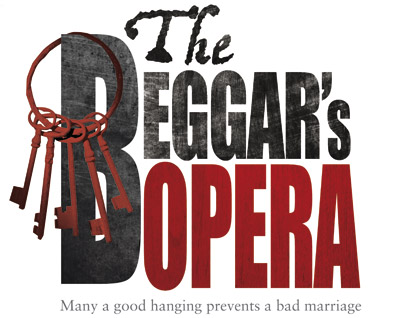
Version 13
Beggar's Opera (2011-06-Open Air Theatre, Regent's Park-London)
Type de série: RevivalThéâtre: Open Air Theatre, Regent's Park (Londres - Angleterre) Durée : 3 semaines Nombre : Première Preview : 23 June 2011
Première: 28 June 2011
Dernière: 23 July 2011Mise en scène : Chorégraphie : Producteur : Star(s) : Avec: Phil Daniels (Mr Lockit), David Caves (Macheath), Beverly Rudd (Lucy Lockit), Jasper Britton (Mr Peachum), Janet Fullerlove (Mrs Peachum ), Flora Spencer-Longhurst (Polly Peachum), Akiya Henry (Suky Tawdry), Lucie Skeaping (Jenny Diver), Karen Anderson (Mrs Traipes' Assistant) Jack Bannell (Ben Budge), Keith Dunphy (Matt of the Mint), Oliver Hoare (Filch), Rob McNeil (Gang), Fernanda Prata (Woman of the Town), Vinicius Salles (Gang), Frank Scantori (Jailer/Mrs Traipes)Commentaires : For once this was a production of “The Beggar’s Opera” set in its original period, allowing the audience to make its own connections between 18th Century and 21st Century politics and society. As such it was much praised as one of the best of the many revivals over the past decades.Presse : "At its best, The Beggar’s Opera proves a darkly entertaining night in the park and Lucy Bailey’s production is the most persuasive account of this perplexing classic I have seen."
Charles Spencer for The Daily Telegraph
"Delightful production...Where the show most succeeds is in projecting Gay's point that the criminal underworld was a mirror image of high society...It's a fine show "
Michael Billington for The Guardian
Pas encore de video disponible pour ce spectacle